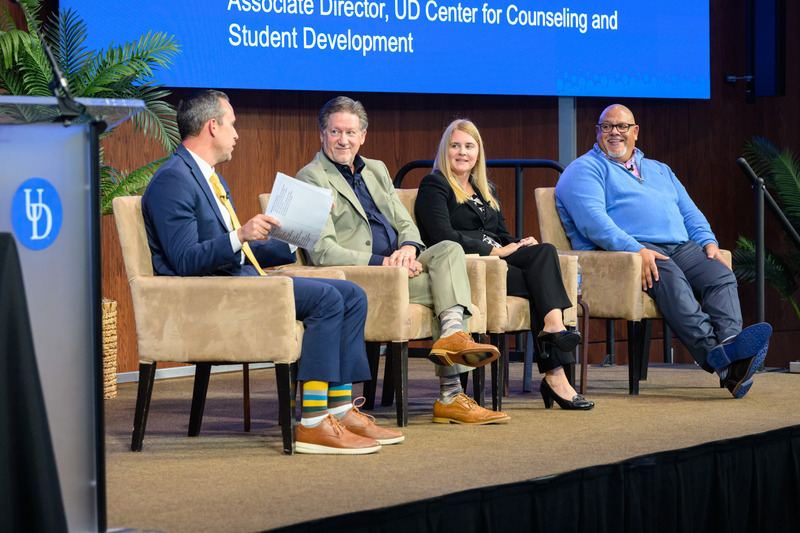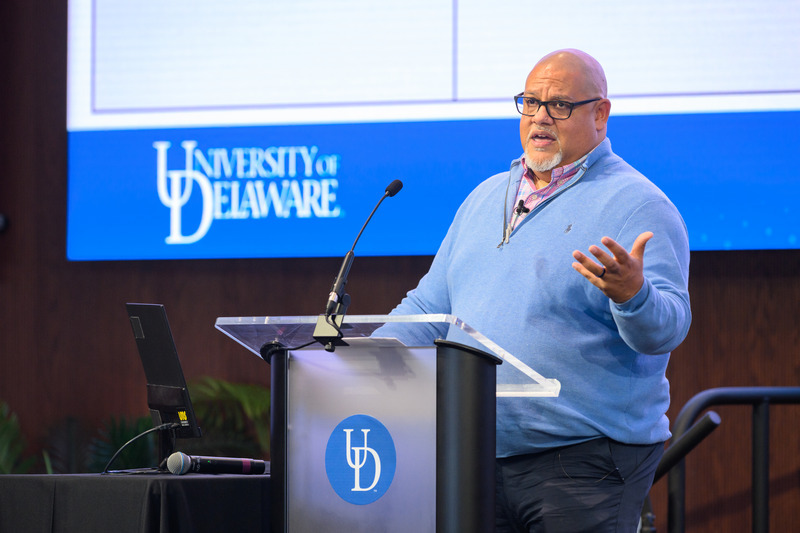


Building resilience together
Photos by Evan Krape November 14, 2025
UD experts urge authentic connection in a digitally distracted world
From economic uncertainty and political discord to personal battles with illness, mental health and grief, the struggle is real. Simply waking up and putting one foot in front of the other when you don’t feel like it shows resilience.
“We are more connected digitally than ever, yet we have greater loneliness and dissatisfaction with our lives,” said Gregory Cooper, associate director of psychiatric and addiction services at the University of Delaware’s Center for Counseling and Student Development (CCSD).
Cooper was the keynote speaker at the 2025 Evelyn R. Hayes Innovation in Healthcare Symposium, hosted by the College of Health Sciences (CHS) on STAR Campus on Oct. 27.
This year’s symposium focused on cultivating resilience in a tumultuous world.
“Resilience is something we all need to face adversity, adapt and grow stronger,” said Jillian Trabulsi, interim dean of CHS. "Resilience reminds us progress isn't defined by what we avoid, but by how we respond.”
Since 2014, the Hayes Symposium, made possible through the generous support of Evelyn R. Hayes, Trustees Distinguished Professor Emerita in UD’s School of Nursing, has sought to bring community members, legislators, clinicians, researchers, students and faculty together to learn and share information to improve Delawareans' quality of life. In a call to action, Hayes encouraged attendees to apply their unique skills to strengthen resilience in clinical practice, education and communities.
“The past few years have reminded us that resilience isn't optional — it's essential,” Hayes said. “But resilience isn't something we're born with; it's something that we build. It's forged in the fires of experience, shaped by support systems, and strengthened by purpose.”
Post-pandemic, resilience has become a buzzword, shorthand for strength. Cooper challenged that notion.
“Being strong and tough isn’t necessarily resilience. Resilience is not toxic positivity or an Instagram influencer with the perfect lighting and outfit, telling us everything will be OK,” he said.
Instead, he said true resilience is being a self-aware problem-solver — someone who’s flexible, optimistic and possesses emotional intelligence and self-compassion.
Threats to resilience
Chronic stress from the “always on” culture, the 24/7 news cycle, health neglect, loneliness and a loss of purpose threaten resilience.
“The data shows that students are no longer coming to college looking for purpose — it’s not even on their radar,” Cooper said.

Digital stress is taking a serious toll.
“The rapid increase in young people’s use of digital media is creating a profound divide between them and the adults in their lives, from parents to educators,” Cooper said.
He likened cellphones to portable anesthesia devices.
“We have the ability, any time we want, to use our phones to check out and escape how we’re feeling,” Cooper said. “We are acquiring the inability not only to manage our feelings but to feel them.”
Building resilience
In a subsequent panel discussion, experts noted how students are handling stress.
Cynthia Diefenbeck, director of the CCSD, said that crisis visits have risen this fall compared to last fall.
“We’re seeing a lot of fear, anxiety, and depression,” Diefenbeck said. “We are happy students are seeking help and support, but it’s a significant increase.”
She noted that for many, therapy is just one piece of the puzzle.
“If every student went to therapy, we’d need 975 therapists,” she said. “We need more natural places for connection — religious organizations, peer groups; we must build that infrastructure outside of traditional mental healthcare because it takes a village to raise all of us.”
Cooper emphasized the next step:
“Managing our digital interaction and fear is essential to developing, creating, and cultivating resilience,” he said.
He also encouraged people to take small steps that will lead to larger change over time.
Chris Locke, who founded the SL24 Foundation and Sean’s House, a support organization created after his son died by suicide in 2018, highlighted the importance of honest conversations about mental health.
“We’ve saved 175 from suicide in the last five years,” said Locke. “This generation is open to talking about personal struggles and removing the stigma.”
He believes the fear and anxiety teens and young adults feel are amplified by social media.
“When I was in high school, I made mistakes, and only a few people knew about it,” Locke said. “If they make a mistake now, it’s posted online, hundreds see it, and it lives on forever; they’re in constant fear of failure.”
Locke encouraged families to remove phones from the dinner table and be vulnerable in discussions to build resilience.
Diefenbeck stressed that struggles unite us.
“Even the hardest things in life happened to put you exactly where you need to be,” she said.
Cooper called on parents to model what they want to see in their children.
“Create time, space and opportunity for authentic connection that competes meaningfully with digital media, and take care of yourself so you can take care of others,” he said.
Contact Us
Have a UDaily story idea?
Contact us at ocm@udel.edu
Members of the press
Contact us at mediarelations@udel.edu or visit the Media Relations website

